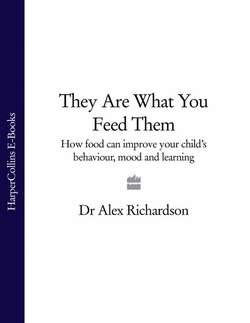Читать книгу They Are What You Feed Them: How Food Can Improve Your Child’s Behaviour, Mood and Learning - Dr Richardson Alex - Страница 15
Chapter 2 Facing The Facts
ОглавлениеWhen it comes to how much we—the public—usually get to know about the foods we eat, and what we’ve been feeding to our children for years now, I’m afraid it’s rather like the old joke about the ‘mushroom’ style of management, namely: ‘Keep them in the dark, and feed them ****.’
For a long time, both the food industry and successive governments have effectively kept quiet about many things they’ve known (or should have known) about the appalling nutritional quality of much of our food—and children’s food in particular. Many of these appalling facts are available to anyone willing to read up about this subject (although, ironically enough, I’ve found that some of the best books are often in the ‘politics and economics’ section of bookstores rather ‘nutrition’).1 It took Jamie Oliver’s stunning TV series on the state of school dinners to bring some of these issues to public attention and make the UK Government finally admit that there is a problem.
A poor diet leads to poor health.
The real trouble is that cheap, low-quality foods and drinks bring big profits to those who get away with selling them. (All the better if the contract is with a Government agency and lasts for years, as some school dinner contracts do.)
Reading through this chapter, have a think about whether there might be a connection between diet and why your child misbehaves, gets moody, is often tired, or has problems learning. If you saw Jamie’s School Dinners, you may remember that many people interviewed spoke about the dramatic changes in some children’s behaviour after ‘dumping the junk’ and feeding them with real, freshly cooked food. When the media followed up on this, they naturally wanted to track down the ‘scientific evidence’ for this remarkable phenomenon, and speak to the scientists involved in such research. So on one particularly memorable morning, I got four different phone calls on my mobile as I dashed between meetings in Oxford, London and Cambridge (via Luton airport to pick up a colleague!). When even the Financial Times joined in I realized that the ‘food and behaviour’ issue really had hit home. This was the aspect they all seemed to be interested in—and no surprises there, really. The only trouble was there clearly weren’t enough scientists to go around, so I found myself deluged for some time.
